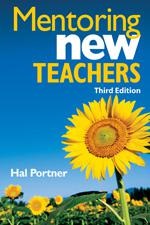Description
Mentoring New Teachers
TotalPages: 168
In supporting Droichead, this book provides practical, doable strategies and guidance to mentors on the school’s Professional Support Team, as well as the opportunity to practice those strategies with immediate feedback. A short and easy read for people who need good advice but don’t have a lot of time to spare.
Quality mentoring can provide the support and guidance critical to an educator’s first years of teaching. In the latest edition of the best-selling Mentoring New Teachers, Hal Portner draws upon research, experience, and insights to provide a comprehensive overview of essential mentoring behaviors. Packed with strategies, exercises, resources, and concepts, this book examines four critical mentoring functions: establishing good rapport, assessing mentee progress, coaching continuous improvement, and guiding mentees toward self-reliance. Tools and topics new to this edition include:Teacher mentor standards based on the NBPTS standards and validated by the International Mentoring AssociationClassroom observation methods and competency instruments.
The Professional Support Team can use this step-by-step handbook to create a dynamic mentoring program or revitalize an existing one.
Acknowledgments
About the Author
Introduction
|
Effective Mentors Are Made, Not Born |
|
|
Mentoring Is Not Evaluating |
|
|
Mentoring’s Role in Induction |
|
|
The Mentor’s Primary Role |
|
|
What Mentors Do: The Four Mentoring Functions |
|
1. Relating
|
Paying Attention to Thoughts and Feelings |
|
|
The Student Teacher Dilemma |
|
|
Communicating Nonverbally |
|
|
A Checklist of Relating Behaviors |
|
|
A Mentoring Relationship Is a Serving Relationship |
|
2. Assessing
|
The Nontraditional New Teacher |
|
|
Generic Needs of New Teachers |
|
|
Specific Needs of Your Mentee |
|
|
Your Mentee’s Learning Preferences |
|
3. Coaching
|
The Preobservation Conference |
|
|
The Initial Classroom Visit |
|
|
Focused Classroom Observations: When and How |
|
|
Some Observation Considerations |
|
|
The Postobservation Conference |
|
4. Guiding
|
Guiding Your Mentee’s Journey: A Decision-Making Process |
|
|
Identifying Your Mentee’s Problems |
|
|
The Unwilling and Unable Mentee |
|
|
The Moderately Willing and Somewhat Able Mentee |
|
|
The Competent and Confident Mentee |
|
|
The All-of-the-Above Mentee |
|
|
From Mentor-Mentee to Peer-Peer |
|
5. Mentoring’s Legacy: Career-Long Professional Development
|
Teacher’s Inquiry Process |
|
6. Tips and Observations
|
Avoid Information Overload |
|
|
Mentoring, Remediating, and Peer Review |
|
|
Maintain the Relationship |
|
|
What Is Your Mentee Asking For? |
|
|
Earn Points Toward Teacher Recertification |
|







Reviews
There are no reviews yet.